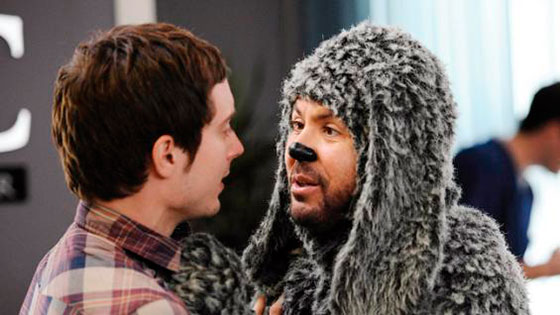Wilfred – Series Finale Interview with David Zuckerman

Nerdly had a moment to correspond with David Zuckerman, the mastermind behind the U.S adaptation of FX’s surprisingly sweet and often endearingly crass Wilfred. It ended it’s four season, forty-nine episode run on Wednesday with a touching, poignant tear-inducing hourlong episode. I watched it and felt immediately comfortable and happy with the ending. I was happy that the series ended precisely correct for what the writers had envisioned for the entirety of the run. There were moments that fulfilled everything that the show promised and left no strings lingering.
It ultimately ended as a sobering account of someone’s mental illness. There wasn’t some grand mytholgical ending where Wilfred was a mischevious god named Krungel or Matdamon. Nope. But it didn’t need that. It offered rational answers for everything and even gave us answers to why Wilfred looks the way he does, or who Bruce is. What we were left with was a show where the hero doesn’t get the girl, and resigns himself to a world where he lives with his imaginary friend in a Calvin and Hobbes meets Brian Griffin world. And it was the happiest ending that you could imagine for the show.
Because the moments when Wilfred dies, the real Wilfred, the one that Jenna owned and loved, was a touching moment that was capped by the scene where we really see Wilfred. And goddamnit, I lost it. I lost it all. Because that moment was earned.
Kudos, David Zuckerman and company. You made me a happy fan of the show. And onto the interview!
How did the “Flock of the Grey Shepherd” element come into the overall story in the final season, and how did you ultimately come to approach it as a red herring distracting away from Wilfred’s true identity?
I don’t think it was a red herring, but rather an important piece of backstory that explains why Ryan imagines Wilfred in the first place. We always knew how we’d end the show — the reveal that Wilfred was simply a manifestation of Ryan’s mind. What we didn’t know early on was the “why” of it all. Why a dog? Ryan had lost his beloved childhood pet, Sneakers, but that didn’t seem like enough. We wanted it to be more of a mystery. Near the end of the story-breaking process in Season 2, we started talking about laying in some stuff we could pay off later. Someone pitched the image of a blue barn. We started laying in that imagery, even though we didn’t yet know how we’d use it. There were also few twists we knew we wanted to incorporate into the mythology. We knew it would be a great reveal if Kristen had drawn the childhood drawing with Wilfred in it. We knew we wanted to reveal that Henry wasn’t really Ryan’s father, but was in fact a caring, loving man who adopted Ryan and tried to give him structure. And we knew we wanted to give Catherine — a seemingly innocent, benign character — a darker history. Reed and Eli pitched the idea of the cult. For a while, the pitch was that Wilfred was actually a magical creature, but that just didn’t feel satisfying to me. It felt too deus ex machina — literally. At the beginning of season 4, we figured out how to use the cult as the “why” of it all.
The scene where Ryan ultimately sees Wilfred as the true dog he is a powerful moment. Were there any scenes where Ryan was going to see Wilfred as a true dog prior to that episode? It’s treated as, and is a very powerful moment that brought tears to my eyes.
One of the things I liked most about the Aussie version was that they never showed Wilfred as a real dog. I think Jason said at one point the contemplated doing it for a joke but ultimately decided against it, and I think that was a wise decision. My pitch for the show was that the entire show is from Ryan’s POV. We the audience should only see and know what Ryan does, so we would be experiencing the uncertainty and tensions along with Ryan. Cutting to another angle and seeing the dog as real would be letting the audience off the hook; it would give them a reassurance Ryan never gets. I never wanted us to see Wilfred as a real dog until the very end of the show, and even then I wasn’t sure it was a good idea. But in the moment when Wilfred dies, when Ryan feels truly alone, it felt right that Ryan (and we) should finally see Wilfred as a dog. I think that’s why the moment is so powerful — we really feel like Wilfred is gone, and our reality is forever altered.
Was it always meant to be an ending where Ryan didn’t get his happy ending, i.e, the “girl, the gold watch and everything?” Or was it something that changed from the overall arc from the beginning?
We had a lot of conversations about Ryan and Jenna’s relationship. The will-they-or-won’t-they element is very familiar, and sometimes I felt we relied on it so much that it became repetitive. Thank god we only had to stretch it out over 49 episodes! I think everybody expected them to end up together, and one of our goals on WILFRED was to surprise the audience. We started thinking about non-traditional endings. Bittersweet endings where characters get what they need, but not necessarily what they want. With this in mind, we all agreed it was best to have Jenna end up with Drew. She’s such a sunny, happy character that it felt especially sad to give her a more tragic ending. I love Jenna, but I think Ryan will be better off without her.
It’s really a “happy ending,” and yet, it’s a very dark ending for the show to leave Ryan living with his “mental illness” rather than him coming to terms with his illness. How did you perceive the ending?
I think the ending is similar to A Beautiful Mind. Ryan, like John Nash, is never going to be “cured.” The best he can do is learn to understand and embrace the part of his psyche that is Wilfred. As Wilfred says, “I tell you the right thing to do, you don’t do it, so I make your life a living hell until you do what I told you to do in the first place.” Ryan learns to listen to his instincts, the part of himself that can help him survive. It’s just that his instincts manifest themselves as an Australian man in a cheap dog suit.
With Ryan’s mother seeing the cat, was that an idea that Ryan truly had his mother’s illness or that he was just seeing through his own eyes? Almost as if he was projecting his illness on to others.
In retrospect, that bit was a mistake! It broke our rule of only showing the audience Ryan’s POV. We thought it was too good a joke to pass up, and we were thrilled that Rhea Pearlman agreed to do such a small role for us. It sort of makes sense, given Catherine’s history with the cult. But if we were doing it all over again, I’d probably cut that bit.
Because Robin Williams appeared in the season two premiere “Progress,” and has a very meta role alluding to his career, I felt a need to ask about Robin’s role. I had talked to Jason Gann about it as well and wanted to get his involvement from another angle.
Because of the timeliness of the interview, I just have to ask, what was it like working with Robin Williams in season two, and did he bring anything to his role? Any suggestions offered?
We had just finished breaking all of our stories for Season 2 and had a few scripts written when we got word that Robin wanted to do a guest arc on our show. He was a friend of Elijah’s and a big fan of Jason’s work on the show. We were so excited, but it would have meant throwing out all of our stories. Robin’s people said he was open to a guest shot, so we rewrote the premiere episode and tailored the role of Ryan’s doctor at the asylum for Robin. The fact that one of Robin’s most iconic roles was in a Matt Damon move (Good Will Hunting) gave us a great opportunity for an amazing joke/reveal that Robin was actually playing himself. But actors don’t usually like to play themselves, and we weren’t sure he’d be open to this twist. We left it ambiguous in the script and decided to pitch it to him in the moment. Robin came on the set and was the kindest, sweetest, most humble man you could imagine. He was a fan of Wilfred and adjusted his energy perfectly to the tone of our show. He did his scenes as scripted, then we gave him a couple of takes to play and improvise. When it came to the big twist/reveal, he not only embraced the joke, he ad-libbed a Mork & Mindy “Shazzbot!” that I would never have dared ask him to do.
The entire week he acted as though we were doing him a huge favor by having him on the show, when the truth was the exact opposite. He was working for far, far below his quote. He had a smile and a kind word for everyone, and regaled us with hilarious stories about his career and life. When we wrapped him, the entire crew cheered and applauded. He had tears in his eyes and thanked us profusely. He was just extraordinary, on and off camera.
Wilfred is really about recovery from depression and addiction, and I think maybe that’s why Robin was drawn to the show. He spoke openly about his addiction while hanging out on the set, and I remember thinking, “This guy gets it. He is living in recovery. He is a miracle.” When I heard he’d killed himself I literally gasped, “Oh no!” I didn’t know him well, but like everyone in America (and maybe the world), I feel like I did. He radiated warmth and love and humor.







































Am I the only one that thought Jenna and Ryan never should have been together? That Jenna actually WAS happier with Drew? That’s the implication I got. She seemed infinitely more happy around Drew than around Ryan. Maybe the actors didn’t portray it well enough, or maybe the actors of Jenna and Drew just had better chemistry from all their time working as a couple, I don’t know.
And what Jenna said about exaggerating.. that rings so true. When you’re angry/upset with someone you say that kind of shit, when you see them again you realize you really love them. I see nothing tragic about it, I think Jenna got a happy ending, and she seemed sad because she did love Ryan (as a friend) and hated hurting him.
That’s how I saw it.. as this show has taught us, perception is everything.
Thanks again David, this show has had such a profound impact on me..
Literally no one wanted Ryan to end up with Jenna. The final episode was heavy on the bitter and light on the sweet. Ryan continuing on through life mentally ill is very disheartening. Whats worse is that he hasn’t even got over the need to see Wilfred. Anyone recovery he had since episode 1 is minimal and quite tenuous. Look at how easy he went back to suicide.
The only thing I agree with here was that the mom seeing the catlady was a mistake.
I never really cared what Wilfred was. I would have preferred the mystery of Wilfred to remain. I just wanted them to be best buddies forever and for Ryan to accept Wilfred as a part of his life and not care what brought Wilfred to him. Still knowing that Wilfred is a manifestation of Ryan’s mental illness and that Ryan accepted it and could now move on in a healthier manner with Wilfred was somewhat satisfying. Still will remain one of my all time favorite shows. I’m glad Ryan and Jenna didn’t end up together. I wish that he and Amanda would have ended up together. I loved her criminally insane or not.